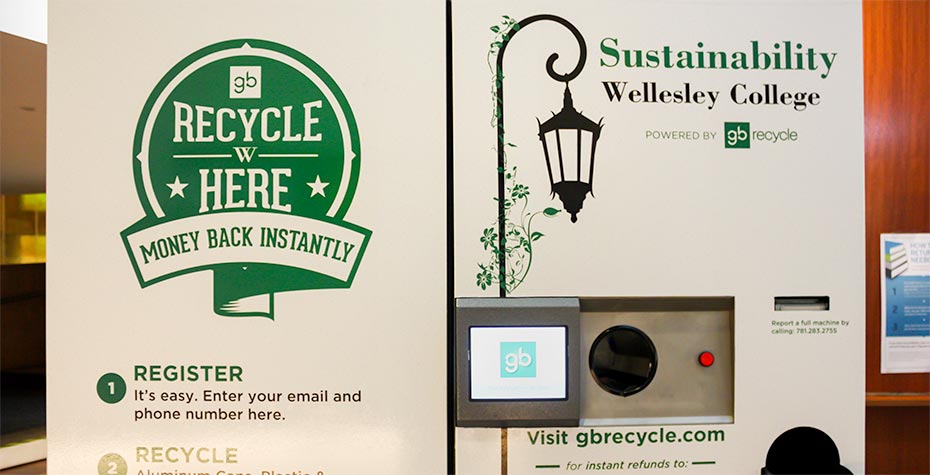Summer Is Off to a Green Start with New and Repeat Sustainability Projects at Wellesley

As the academic year came to a close, the Wellesley Office of Sustainability continued its popular Sustainable Move-Out, made individual recycling easier in the campus center, and installed two electric car charging stations in the Davis parking structure.
Sustainable Move-Out
Since 2010, Wellesley Office of Sustainability has held a Sustainable Move-Out each year to reduce the amount of waste that students generate at the end of the academic year. Sustainable Move-Out runs from exam reading period until commencement, and students are encouraged to donate reusable items, by dropping them off in orange bins placed in each residence hall. All the donated goods are either resold at a rummage sale at the start of the next academic year, with the proceeds going toward more green initiatives on campus, or they are given to a charity.
The Sustainable Move-In Rummage Sale is a great resource for students moving in to res halls in the fall semester and looking for deals on lamps, kitchen supplies, containers, refrigerators, electronics, books, toys, furniture, school supplies, and more. Clothes and shoes from Sustainable Move-Out are donated to Big Brothers and Big Sisters; linens and bedding are donated to Rosie’s Place, a women’s shelter in Boston. All the items are sorted and bagged by Sustainable Move-Out workers hired by the sustainability office.
During the rummage sale in fall 2011, 90 percent of Sustainable Move-Out inventory was sold and raised almost $4,000 for sustainability projects; 14,563 pounds of clothing were donated. In 2012, the rummage sale collected almost $6,000 and all leftover items were donated to Safe Haven, a halfway house in Boston, so that the event created zero waste. These efforts could not be done without the help of student workers and the entire student body.
To find out how to be involved with sustainable move out contact Patrick Willoughby at pwilloug@wellesley.edu.
The Green Bean
A new addition to the Lulu Chow Wang Campus Center is the Green Bean, a social recycling platform that allows students and faculty to receive money for recycling. Users register by entering their email addresses and phone numbers on the touch screen. They can then deposit their cans and bottles in the Green Bean. Recyclers will immediately receive an email notification to create an online account, which will log the number of bottles they have recycled and the amount earned. When a recycler signs up for the first time, she will receive $1 and receive a dollar for each person she refers. Each bottle usually returns 5 cents, and although plastic water bottles do not have a rebate, they will help recyclers move up on the online recycling leaderboard. The rebate from recycling will either be paid directly to the recycler’s PayPal account or to a charity of her choice.
Students and colleges that recycle the most will not only receive rebates but can also win gift cards and prizes such as an iPad mini for most frequent recycler or most bottles recycled. Currently the Green Bean has been installed on five other campuses besides Wellesley: Brandeis, Harvard, MIT, Tufts, and Northeastern. Green Bean will expand to Bentley and Merrimack in the coming months.
Green Bean CEO Shankar Sahai started the company in 2011 and this is the first year that the Green Bean has appeared on college campuses. Sahai’s inspiration was to “change people’s behavior and help them see the difference they can make just by recycling.” The Green Bean runs on real time so that when a bottle is recycled the amount of waste saved in a landfill pops up on the touch screen.
Recyclers may already be familiar with the recycling machines seen in grocery stores, but the Green Bean takes all beer, soda, and water bottles. Sahai has said that the Green Bean will recycle 100 percent of all bottles and cans and return higher quality and cleaner materials to manufactures that use the recycled cans and bottles.
In the fall the Office of Sustainability will search for two Green Bean ambassadors; students who will be marketing the Green Bean on campus through challenges, and maintaining it. In the near future, Sahai plans to release a mobile app so that students can track their recycling progress. To find more about how to become an ambassador or about the recycling campaign visit Green Bean's website.
Electric Car Chargers
Another new push on the sustainability front includes the installation of two new electric car-charging stations in the basement of the Davis parking structure. The eVlink charging station can charge a hybrid or electric car up to 80 percent full in 30 minutes. This charger is free of charge to Wellesley students, faculty, and staff.
To learn more about the new charging stations visit the manufacturer's website.
—Kathy Long '15
